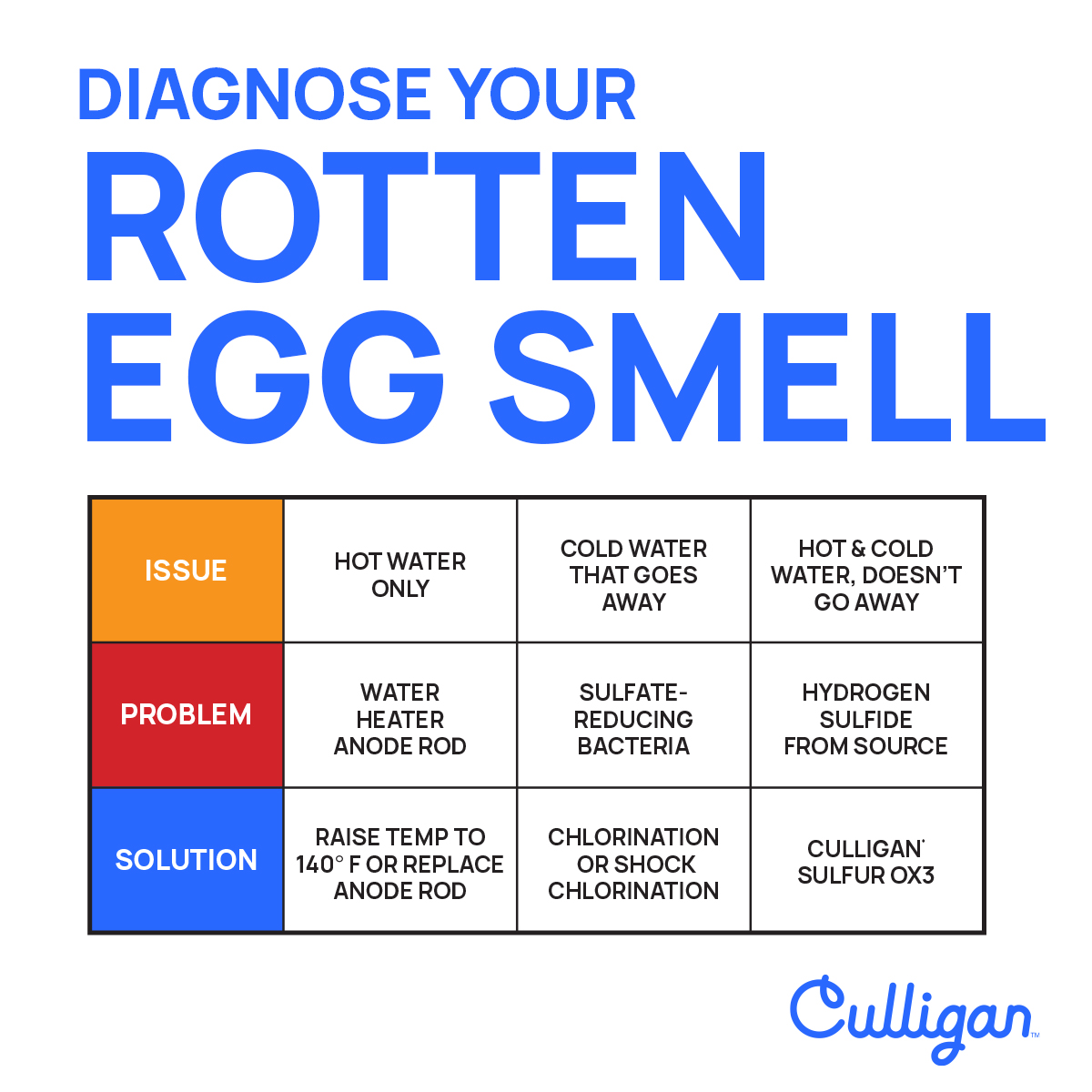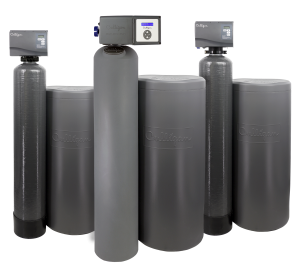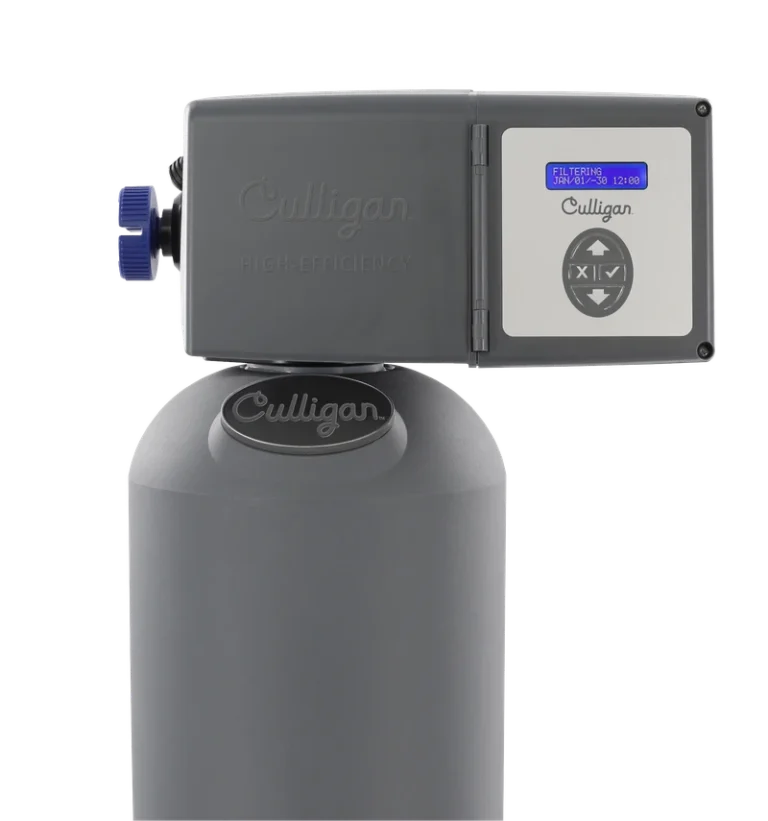Why Does My Tampa Tap Water Smell Like Rotten Eggs?
The question is, will a rotten egg smell, be harmful to my health and home. It can be.
Hydrogen sulfide, that rotten egg odor is a product of sulfur bacteria in groundwater using iron and sulfur as energy to chemically change sulfates to gas, which is flammable and poisonous at high concentrations.
The EPA standards for water fall into two categories: Primary and Secondary standards.
Primary standards are based on health considerations and secondary are based on taste, color, odor, corrosively, foaming, and staining properties. Sulfate is classified under secondary standards.

Why Choose Culligan for Sulfur and Rotten Egg Smell Removal?
If your water smells like rotten eggs, sulfur is likely the culprit—and Culligan has the solution. Our water treatment systems, including specialized filters and whole-home solutions, are designed to target hydrogen sulfide and other sulfur-related compounds that cause unpleasant odors and taste. With free water testing and customized treatment plans tailored for Tampa’s unique water supply, Culligan helps eliminate sulfur issues at the source—restoring fresh, clean water to every faucet in your home.
Solutions
Products to Fix Smelly Water

Aquasential™ Smart High Efficiency Water Softener
- Smart brine tank auto-monitors salt levels
- Convenient auto-bypass valve
- Reliable non-corrosive valve
- Worry-free maintenance

Aquasential™ Smart High Efficiency Whole House Water Filters
Reduce sediments in your water and contaminants that cause your water to appear, taste, and smell unpleasant. Your system can also lessen the taste and odor of chlorine, and prevent pipe damage and staining from low pH water. Additional customizations include:
- Culligan® Filtr-Cleer® Water Filters – Reduces Sediment Problems
- Culligan® Cullar® Water Filters – Reduces Taste and Odor Problems
- Culligan® Cullneu Water Filters – Reduces Acid Problems
On The Offensive: Where Does Rotten Egg Smell in My Tampa Tap Water Come From?
Sources for sulfates include decay, organic matter, or chemical reactions with sulfur-containing minerals in soil and rock.
Naturally Occurring – Sulfates are a result of naturally occurring elements of sulfur and oxygen in some soil and rock formations that contain groundwater.
Nearby Industries – Oil & Gas, Fracking, Mining – Hydrogen sulfide can be in wells drilled in shale or sandstone, or near coal and peat deposits, or oil fields.
Community Hazards – Nearby landfills, leaky fuel tanks or pipelines, old septic systems, and chemical labs.
Electric Water Heater – The magnesium corrosion control rod can chemically reduce naturally occurring sulfates to hydrogen sulfide. See more below.
Sulfur in Water Normally Not Poisonous — So How Does It Affect Me?
Aside from the smell and taste being an issue, water containing an excess in sulfur can cause issues with several household items, infrastructure, and daily tasks:
Shortened Lifespan of Household Items
Sulfur can erode household appliances, fixtures, and pipes made of copper, brass, iron and steel, leading to shorter lifespans for these household items.
Staining
Sulfur may cause black and brown staining of household fixtures such as sinks, bathtubs, and toilets. Sulfur can also stain laundry.
Tarnish
If sulfur is present in your water, it can cause tarnishing and discoloration to silver, copper, and brass silverware.
Metallic Taste
Sulfur is known to give drinking water a metallic taste which can also be noticeable when the water is used for cooking.
When hydrogen sulfide is present in water, it can produce a smell that is commonly compared to ‘rotten eggs.’ The smell can make the water unpleasant for everyday tasks such as cleaning, bathing, cooking, and consuming.
What is the Source of the Rotten Egg Smell?
Your first order of business is to find the source — in your drain, or in your water. Take a glass of water from the drain area the smell is originating from and take a glass of water from another faucet in your home.
If both glasses of water contain a rotten egg smell, the problem is your water, which could come from several other issues – water heater, well, or municipal. If only one glass has the unpleasant odor, it is most likely that specific drain.
If the smell is present only when running cold water, it is likely due to sulfate-reducing bacteria. These bacteria in your pipes consume sulfate and produce hydrogen sulfide, which causes the odor.
If the smell occurs only with hot water, the water heater is probably to blame. When the anode in the tank starts to deteriorate, it can release a sulfur-like or rotten egg smell into the hot water.
If the smell is noticeable regardless of the water temperature, the issue is with your water source. Whether your water comes from a well or a municipal supply, hydrogen sulfide is entering your home.
If the Smelly Water’s Source is Your Drain
Find the specific drain and pour ½ cup of bleach down the drain to disinfect it. If you are weary of pouring bleach into your drain system, or do not have bleach on hand, dump ½ cup of baking soda and 1 cup of vinegar in your drain. This should be sufficient to disinfect that specific drainpipe.
If the Smelly Water’s Source is Your Water Heater
Hot Water Heater Troubleshooting – If the issue is from hot water only, the likely culprit is the anode rod in your electric water heater chemically reacting with the natural sulfate ions. This rod is typically made of magnesium. Replace this with an aluminum rod.
You can operate your water heater without the rod, though you risk corrosion of your steel water tank after you remove one. Culligan can add FDA-approved corrosion inhibitors to help correct this potential problem and can also remove the sulfate by using a de-alkalizer.
Sulfur-reducing bacteria could be lurking in your water tank without the rod. One way to test for this is to set your water temperature over 140° Fahrenheit for 48 hours to kill the bacteria. If the odor goes away, this was likely the problem. If it does not, it is likely a rod issue.
If the issue is not the rod, you can disinfect and flush the water heater with a chlorine bleach solution to kill the bacteria. This method is quick and simple, however, if any bacteria lingers behind, it can cause the bad smell to return within weeks.
If The Smelly Water Problem Is Your Tampa Water Source – Well or Municipal
If the contamination is located at the actual source of your drinking water, get a water analysis. This test should include a pH analysis, iron, manganese, hardness and TDS (Total Dissolved Solids).
If your tap water in Tampa Bay smells like rotten eggs, you’re not alone. Water customers across Hillsborough County, including neighborhoods like Apollo Beach, Palm Beach, and Sun City Center, have occasionally reported a rotten egg odor or a musty smell coming from their faucets. This unpleasant issue typically arises from hydrogen sulfide gas — a naturally occurring byproduct found in groundwater, underground aquifers, and organic matter.
What Causes the Rotten Egg Smell in City Water?
That signature rotten egg smell in cold water or hot water may originate from your water heater, sulfur compounds in the Floridan Aquifer, or from a hydrogen sulfide removal facility that’s undergoing routine maintenance. Some south-central Hillsborough communities draw water from surface water sources or underground water sources, where sulfur content and sulfur compounds are more common.
Additionally, public water supplies in Hillsborough County are treated at large-scale water treatment plants, where complex systems like the ozone treatment process, chemical analyzers, and chemical feed systems work together to neutralize contaminants. Despite these clean water initiatives, an occasional sulfur smell can still pass through — especially in areas experiencing smell from groundwater supplied or seasonal odor in treatment plants.
What Are Tampa Officials Doing?
Tampa Bay Water, the region’s wholesale water provider, treats and delivers over 200-plus public water systems across the area. Investments in ozone facilities, hydrogen sulfide removal processes, and construction bonds ensure the water department can fund daily operations and efficient methods to provide potable water to residents. Tampa draws from a variety of sources, including natural springs, Sulphur Springs, and the Hillsborough River, part of an 80,000-mile, multi-state aquifer holding billions of gallons of fresh water.
Is Smelly Water a Health Risk?
In most cases, hydrogen sulfide levels are low and fall under non-enforceable guidelines of the EPA’s secondary standards, which focus on odor, taste, and color, not adverse health effects. However, higher-than-recommended concentrations or chronic exposure could lead to potential health risks such as abdominal pain, muscle weakness, or neurological impairments, particularly for pregnant women or those with compromised immune systems.
Concerns about arsenic concentrations, levels of radium, and exposure to hexavalent chromium have also prompted stricter oversight in federal drinking water standards and EWG guidelines. The EPA has set a legal limit and ppb health guideline for many water contaminants, including arsenic levels, to ensure safe drinking water across all municipal water systems.
When to Call a Water Expert
If you’ve tried flushing your water tank, cleaning your water heater, or switching to bottled water without success, schedule a free test. Whether you’re in a suburban zip code near theme parks or a coastal region like Redington Beach, understanding your drinking water quality is critical. Water utilities and public water systems should uphold enforceable limits, but private well owners and those using septic systems should stay especially vigilant.
Don’t let smelly water be an ever-present barrier to enjoying your home. Culligan’s house water filters and sulfur filters are designed to tackle hydrogen sulfide gas levels up to 6–8 ppm, restoring quality water for all your daily needs — whether that’s a glass of water, a shower, or cooking dinner.
How to Remove Rotten Egg Smell From Your Water & Prevent it From Returning
There are a few options to rid your home of smelly water and prevent it from returning.
- Whole House Water Filter: Culligan water filters reduce the bacteria and contaminants such as hydrogen sulfide, giving you cleaner, safer drinking water.
- Reverse Osmosis System: RO systems have a multi-stage filtration system to remove hydrogen sulfide and other impurities from your drinking water.
How do you know which system is best for you? Schedule a free water analysis with our water experts. Our team will be able to determine any issues your water may be facing and suggest the best product(s) for your needs.

Facebook